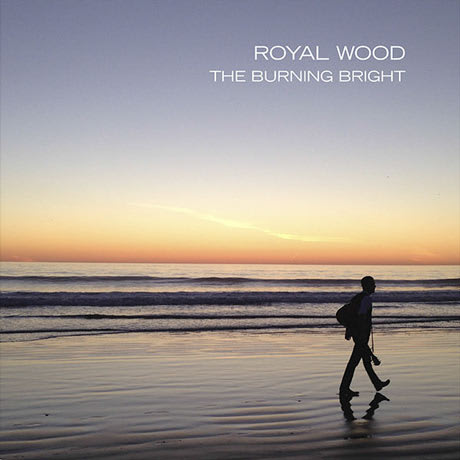Royal Wood belongs to an impressive group of Canadian male singer-songwriters with fabulous names; paging Ron Sexsmith, Hawksley Workman and Rufus Wainwright, to whom he's often compared. Wood, unlike the other three, looks very much the part of a pop crooner, complete with barbershop hair and nicer suits than any of mine, though he's set himself apart on six albums over ten years by experimenting with his musical style. With The Burning Bright, his new full-length record, Wood stays true to form.
The songs here reveal an artist deep in thought and grieving the end of his marriage (to fellow singer-songwriter Sarah Slean), but not necessarily reaching for profound meaning or ways of describing his feelings. "I love you still/ I always will/ The telling of a chronicle/ A wounded heart and a poison pill," he sings on the first track ("I Always Will"). He runs away on track two ("Run Away") and by track three he's making his way, "Like a moth to the burning bright," from the country towards the city lights ("City Lights"). Midway through the album, he's waved a white flag ("White Flag"), counted his bruises ("It's Only Love") and resigned himself to moving on ("I Wish You Well") just in time for the upbeat, radio-friendly "Forever and Ever," co-written with fellow-Canadian singer-songwriter Simon Wilcox.
The respite is short lived, and before long, Wood is standing on a roof looking for proof ("I'm Afraid"), holding a coffin nail, not believing in fairy tales ("Promises") and lamenting a ruined love story all over again ("Pretty One," which sounds oh so much like a Ron Sexsmith tune). This is textbook stuff and the more interesting songwriting might have come from the anger and bargaining stages of grief.
Here's the thing, though: Wood sounds great and so does his band. Lovely and creative use of handclaps, keys, electric and acoustic guitars, the banjo, an accordion, horns, a tin whistle and producer Bill Lefler on drums all elevate the record to something more than just an ode to heartbreak. Wood is sincere, but he's not asking for anyone's pity, so perhaps it's unfair, after everything he's been through, to ask him to war against cliché. It's at these times that the platitudes serve us well and offer us the most comfort. For anyone on their own emotional journey, so too will The Burning Bright.
(Maple)The songs here reveal an artist deep in thought and grieving the end of his marriage (to fellow singer-songwriter Sarah Slean), but not necessarily reaching for profound meaning or ways of describing his feelings. "I love you still/ I always will/ The telling of a chronicle/ A wounded heart and a poison pill," he sings on the first track ("I Always Will"). He runs away on track two ("Run Away") and by track three he's making his way, "Like a moth to the burning bright," from the country towards the city lights ("City Lights"). Midway through the album, he's waved a white flag ("White Flag"), counted his bruises ("It's Only Love") and resigned himself to moving on ("I Wish You Well") just in time for the upbeat, radio-friendly "Forever and Ever," co-written with fellow-Canadian singer-songwriter Simon Wilcox.
The respite is short lived, and before long, Wood is standing on a roof looking for proof ("I'm Afraid"), holding a coffin nail, not believing in fairy tales ("Promises") and lamenting a ruined love story all over again ("Pretty One," which sounds oh so much like a Ron Sexsmith tune). This is textbook stuff and the more interesting songwriting might have come from the anger and bargaining stages of grief.
Here's the thing, though: Wood sounds great and so does his band. Lovely and creative use of handclaps, keys, electric and acoustic guitars, the banjo, an accordion, horns, a tin whistle and producer Bill Lefler on drums all elevate the record to something more than just an ode to heartbreak. Wood is sincere, but he's not asking for anyone's pity, so perhaps it's unfair, after everything he's been through, to ask him to war against cliché. It's at these times that the platitudes serve us well and offer us the most comfort. For anyone on their own emotional journey, so too will The Burning Bright.
